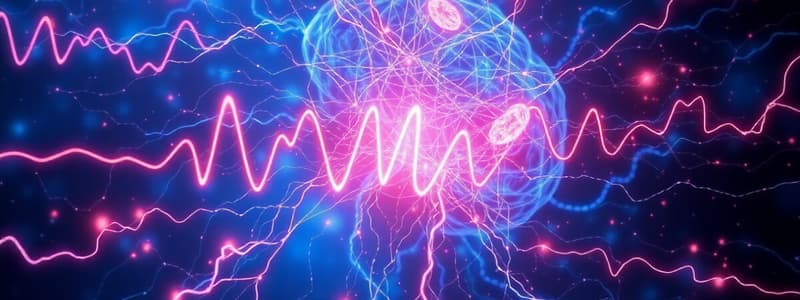Podcast
Questions and Answers
What occurs during the hyperpolarization phase of a neuron?
What occurs during the hyperpolarization phase of a neuron?
- Membrane potential rises above resting state
- Membrane potential drops below resting state (correct)
- Membrane potential stabilizes at resting state
- Sodium channels open completely
What characterizes the absolute refractory period?
What characterizes the absolute refractory period?
- Sodium channels are inactivated (correct)
- Partial recovery of membrane potential occurs
- New action potentials are possible with a weaker stimulus
- Action potential can be generated with any stimulus
What is the role of the myelin sheath in neuron function?
What is the role of the myelin sheath in neuron function?
- Prevents the formation of nodes of Ranvier
- Inhibits signal transmission speed
- Speeds up signal transmission (correct)
- Facilitates backward signal transmission
During which phase is a stronger stimulus required to initiate an action potential?
During which phase is a stronger stimulus required to initiate an action potential?
What are the gaps created by the myelin sheath called?
What are the gaps created by the myelin sheath called?
What is the typical resting membrane potential of neurons?
What is the typical resting membrane potential of neurons?
Which ion is found in higher concentration outside the neuron at resting membrane potential?
Which ion is found in higher concentration outside the neuron at resting membrane potential?
What triggers the all-or-nothing response in action potentials?
What triggers the all-or-nothing response in action potentials?
During the depolarization phase of an action potential, which of the following occurs?
During the depolarization phase of an action potential, which of the following occurs?
What role do sodium-potassium pumps play in neurons?
What role do sodium-potassium pumps play in neurons?
What occurs during the repolarization phase of an action potential?
What occurs during the repolarization phase of an action potential?
Which type of ion channel is always open and allows for passive transport of ions?
Which type of ion channel is always open and allows for passive transport of ions?
What primarily initiates the action potential in a neuron?
What primarily initiates the action potential in a neuron?
Flashcards
Hyperpolarization
Hyperpolarization
A brief period after an action potential where the membrane potential dips below the resting state.
Absolute Refractory Period
Absolute Refractory Period
The period after an action potential where a new one cannot be triggered.
Relative Refractory Period
Relative Refractory Period
The period after an action potential where a stronger stimulus is needed to trigger a new one.
Myelin Sheath
Myelin Sheath
Signup and view all the flashcards
Nodes of Ranvier
Nodes of Ranvier
Signup and view all the flashcards
Neurons
Neurons
Signup and view all the flashcards
Resting Membrane Potential
Resting Membrane Potential
Signup and view all the flashcards
Ion Channels
Ion Channels
Signup and view all the flashcards
Action Potential Initiation
Action Potential Initiation
Signup and view all the flashcards
Depolarization Phase
Depolarization Phase
Signup and view all the flashcards
Repolarization Phase
Repolarization Phase
Signup and view all the flashcards
Refractory Period
Refractory Period
Signup and view all the flashcards
Action Potential Propagation
Action Potential Propagation
Signup and view all the flashcards
Study Notes
Action Potentials: Neural Signal Transmission
- Neurons are specialized cells transmitting information throughout the body
- Key components of a neuron include the cell body, dendrites, axon, and axon terminals
- Neurons function as the body's electrical communication system
- They are essential for thoughts, movements, sensations, and bodily functions
Resting Membrane Potential
- The default state of neurons when not transmitting signals
- Typically around -70 millivolts (mV)
- Maintained by sodium-potassium pumps
- More sodium (Na+) outside the cell
- More potassium (K+) inside the cell
- Creates an electrical gradient across the membrane
Ion Channels
- Specialized proteins in cell membranes
- Types include:
- Voltage-gated channels: Open and close based on membrane potentials
- Ligand-gated channels: Open and close based on specific chemicals (neurotransmitters)
- Leak channels: Always open, allowing ions to move across the membrane via passive transport
- Crucial for action potential generation, controlling ion movement
Action Potential Initiation
- A stimulus causes sodium channels to open
- Sodium ions rush into the cell
- Membrane potential becomes more positive
- Threshold potential reached at -55 mV
- Triggers an all-or-nothing response
Depolarization Phase
- Rapid influx of sodium ions
- Membrane potential becomes positive, peaking at approximately +30 mV
- Sodium channels begin to close
- Potassium channels open
Repolarization Phase
- Potassium ions flow out of the cell
- Membrane potential returns towards the resting state
- Sodium channels remain inactive
- Active transport of ions begins
Hyperpolarization
- Brief period where membrane potential drops below resting state
- Also called the refractory period
- Prevents backwards signal transmission
- Ensures one-way signal propagation
Refractory Periods
- Absolute refractory period: No new action potential possible; sodium channels inactive
- Relative refractory period: Stronger stimulus needed for a new action potential; partial recovery phase
Myelin Sheath
- Insulating material around axons
- Produced by glial cells called Schwann cells
- Speeds up signal transmission
- Creates gaps called nodes of Ranvier
- Enables saltatory conduction
Studying That Suits You
Use AI to generate personalized quizzes and flashcards to suit your learning preferences.




